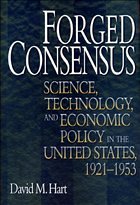In this thought-provoking book, David Hart challenges the creation myth of post--World War II federal science and technology policy. According to this myth, the postwar policy sprang full-blown from the mind of Vannevar Bush in the form of Science, the Endless Frontier (1945). Hart puts Bush's efforts in a larger historical and political context, demonstrating in the process that Bush was but one of many contributors to this complex policy and not necessarily the most successful one. Herbert Hoover, Karl Compton, Thurman Arnold, Henry Wallace, Robert Taft, and Curtis LeMay--along with more familiar figures like Bush--are among those whose endeavors he traces.
Hart places these policy entrepreneurs in the broad scheme of American political development, connecting each one's vision of the state in this apparently esoteric policy area to the central issues, events, and figures of mid-century America and to key theoretical debates. Hart's work reveals the wide range of ideas, often in conflict with one another, that underlay what later observers interpreted as a "postwar consensus." In Hart's view, these visions--and the interests and institutions that shape their translation into public policy--form the enduring basis of American politics in this important area. Policymakers today are still grappling with the legacies of the forged consensus.
Review:
... A provocative new book. . . . It is a book to read, reread, ponder, and argue about, a major work on political language. (Rhetoric and Public Affairs)
Table of contents:
Preface
Abbreviations
Ch. 1
The Malleability of American Liberalism and the Making of Public Policy
3
Ch. 2
The Republican Ascendancy and the Crash: Associative Undercurrents in a Conservative Era, 1921-1932
30
Ch. 3
Trial and Error: Science, Technology, and Economic Policy in the First Roosevelt Administration, 1933-1936
62
Ch. 4
Breaking Bottlenecks and Blockades: The Heyday of Reform Liberalism, 1937-1940, and Its Postwar Consequences
83
Ch. 5
Old Fights, New Accommodations: Wartime Experiments and the Demise of Reform Liberalism, 1940-1945
117
Ch. 6
Groping toward Management: Science, Technology, and Macro-and Microeconomic Policy, 1945-1950
145
Ch. 7
"The Crescendo of Hideous Invention": The National Security State Comes of Age, 1945-1953
175
Ch. 8
The Past in the Present: The "Hybrid" in the Cold War and Beyond
206
Bibliography
235
Index
259
Hart places these policy entrepreneurs in the broad scheme of American political development, connecting each one's vision of the state in this apparently esoteric policy area to the central issues, events, and figures of mid-century America and to key theoretical debates. Hart's work reveals the wide range of ideas, often in conflict with one another, that underlay what later observers interpreted as a "postwar consensus." In Hart's view, these visions--and the interests and institutions that shape their translation into public policy--form the enduring basis of American politics in this important area. Policymakers today are still grappling with the legacies of the forged consensus.
Review:
... A provocative new book. . . . It is a book to read, reread, ponder, and argue about, a major work on political language. (Rhetoric and Public Affairs)
Table of contents:
Preface
Abbreviations
Ch. 1
The Malleability of American Liberalism and the Making of Public Policy
Ch. 2
The Republican Ascendancy and the Crash: Associative Undercurrents in a Conservative Era, 1921-1932
Ch. 3
Trial and Error: Science, Technology, and Economic Policy in the First Roosevelt Administration, 1933-1936
Ch. 4
Breaking Bottlenecks and Blockades: The Heyday of Reform Liberalism, 1937-1940, and Its Postwar Consequences
Ch. 5
Old Fights, New Accommodations: Wartime Experiments and the Demise of Reform Liberalism, 1940-1945
Ch. 6
Groping toward Management: Science, Technology, and Macro-and Microeconomic Policy, 1945-1950
Ch. 7
"The Crescendo of Hideous Invention": The National Security State Comes of Age, 1945-1953
Ch. 8
The Past in the Present: The "Hybrid" in the Cold War and Beyond
Bibliography
Index
Es gelten unsere Allgemeinen Geschäftsbedingungen: www.buecher.de/agb
Impressum
www.buecher.de ist ein Internetauftritt der buecher.de internetstores GmbH
Geschäftsführung: Monica Sawhney | Roland Kölbl | Günter Hilger
Sitz der Gesellschaft: Batheyer Straße 115 - 117, 58099 Hagen
Postanschrift: Bürgermeister-Wegele-Str. 12, 86167 Augsburg
Amtsgericht Hagen HRB 13257
Steuernummer: 321/5800/1497
USt-IdNr: DE450055826
Bitte wählen Sie Ihr Anliegen aus.
Rechnungen
Retourenschein anfordern
Bestellstatus
Storno

